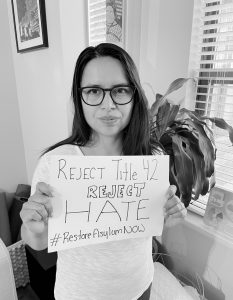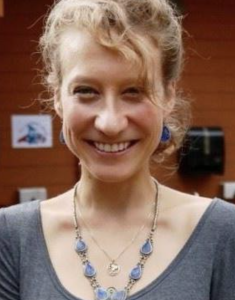It’s one thing to hear or read about Title 42 but quite another to experience the Trump-era immigration policy firsthand, a Haitian asylum seeker said during a recent webinar hosted by interfaith immigration advocates.
In fact, Title 42 is a living nightmare for immigrants ensnared by the federal health code rule, said a man identified only as Daniel. Title 42 cites COVID-19 prevention as a premise for deporting asylum seekers from the United States.
“That happened to me. I have been hearing (about the policy) in the news and social media, but that happened to me. Not only to me, but to many Haitians,” he said during “Heal Not Harm: Restore Asylum Now,” a July 18 livestreamed event sponsored by the Interfaith Immigration Council and designed to inspire grassroots opposition to U.S. policies impeding the nation’s legal asylum system.
The webinar included presentations by immigration advocates from Jewish and Christian traditions. They urged viewers to pressure legislators and the White House to reform and strengthen the U.S. asylum process.
They also presented faith-based arguments for supporting asylum and discussed the tragedies imposed on legal applicants for asylum by Title 42 and Migrant Protection Protocols, a Trump administration policy used to keep asylum seekers in Mexico while their cases wind slowly through U.S. immigration courts.
The policies are particularly unfair, because immigration officers apply them along racial lines, Daniel said. That fact was glaringly obvious to immigrants awaiting deportation in U.S. detention centers and along the southern border, he stressed.
“This is a crime … because I have come to ask for asylum and get handcuffed instead. That’s a crime.”
“They released the Venezuelans. They released the Cubans. And other people from other nations were released,” he said. “This is a crime … because I have come to ask for asylum and get handcuffed instead. That’s a crime.”

Melina Roche
Title 42 essentially ended the longstanding American practice of allowing immigrants to apply for asylum upon entering the United States from Mexico, said Melina Roche, an asylum advocate for Welcome with Dignity.
According to the American Immigration Council, close to 2 million asylum seekers have been deported to Mexico or their countries of origin under the policy, which a Trump-appointed federal judge instructed the Biden administration to continue.
The U.S. Supreme Court in June ruled the White House is within its rights to terminate the Migrant Protection Protocols, also known as MPP and “Remain in Mexico.” But the White House has not taken the steps to do so, Roche said.
“Both of these are unprecedented policies that undermine our moral and legal obligations to welcome asylum seekers and combined have essentially closed the border to all seeking safety,” she stressed.
Some members of Congress are seeking to codify both policies, in case the president or the courts eventually allow them to be terminated, she said.
“We are called to invite, to welcome, to be instruments that heal the pain and most importantly to challenge and dismantle structures, systems and policies that harm, exclude and discriminate.”
“These legislative efforts are extremely dangerous,” she added. “They would close the borders to asylum seekers indefinitely.”
Roche urged individuals to call or write legislators to oppose those efforts. “We have heard over and over from our champions and our friends in Congress that direct engagement from constituents on these issues makes a huge difference with members of Congress who are on the fence,” she said.
Other advocates said people of faith should consider the commands of their religious traditions to treat migrants with compassion.

Merwyn De Mello
“We are called to invite, to welcome, to be instruments that heal the pain and most importantly to challenge and dismantle structures, systems and policies that harm, exclude and discriminate,” said Merwyn De Mello, an advocacy associate with the Franciscan Action Network. “Let us put our God-bestowed power to that awesome effect.”
De Mello once benefited from such generosity and compassion, he said. “It is faith and grace that has brought me to this country, having traversed many borders, and on the way encountered people who welcomed the stranger,” he reported. “Borders separate and divide. The journeys of our immigrant guests across the thousands of miles are fraught with labor and pain and are laden with trauma.”
Protecting asylum seekers by holding elected officials to higher standards is nothing short of holy work, added Laura Rumpf of T’ruah: The Rabbinic Call for Human Rights.

Laura Rumpf
“In the Jewish tradition that I come from, there are as many names for God as there are human beings. My favorite is ‘Source of Life,’” she said. “We are engaged in the sacred work of healing our broken asylum system.”
Lutheran minister Ann Helmke, the faith liaison for San Antonio, Texas, said the city has opened an immigrant resource center and taken other steps that model how to treat asylees and others seeking refuge in the United States with dignity and hospitality.
“The right thing to do is to welcome people here the way we wish to be welcomed in our own lives and not to turn others away,” she urged. “We practice it here in terms of our policies and procedures. We do these things because it’s the right thing to do.”

Kristen Kumpf
Advocating for asylum seekers is an action that reflects the image of God, noted Kristin Kumpf, director of human migration and mobility for the American Friends Service Committee.
“We need to do something to stand with all who seek asylum in this country and especially to say to our members of Congress and to our administration that we need to see change happen today,” she said. “It is time to stop harming. It is time to heal. And it is time to restore the asylum process.”
Related stories:
7 reasons to calm down about the termination of Title 42
Why all the fuss about the ‘Remain in Mexico’ immigration policy?
We must not look away from 8,800 expelled immigrant children
